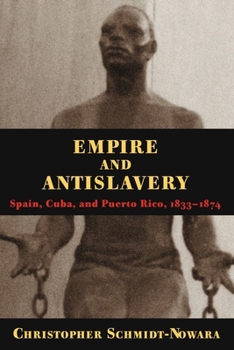Empire and Antislavery: Spain Cuba and Puerto Rico 1833-1874
(Part of the Pitt Latin American Studies Series)
Select Format
Select Condition 
Book Overview
In 1872, there were more than 300,000 slaves in Cuba and Puerto Rico. Though the Spanish government had passed a law for gradual abolition in 1870, slaveowners, particularly in Cuba, clung tenaciously to their slaves as unfree labor was at the core of the colonial economies. Moreover, the Spanish bourgeoisie was deeply implicated in colonial slavery as Spain was the last European power to abolish the slave trade and bonded labor in the Americas.
Format:Paperback
Language:English
ISBN:082295690X
ISBN13:9780822956907
Release Date:May 1999
Publisher:University of Pittsburgh Press
Length:256 Pages
Weight:0.80 lbs.
Dimensions:0.6" x 6.0" x 9.0"
Customer Reviews
2 ratings
WOW!!!!!
Published by Thriftbooks.com User , 24 years ago
This is an incredible book for anyone interested in the abolition of slavery.
A major break through
Published by Thriftbooks.com User , 25 years ago
Christopher Schmidt-Nowara has written an excellent book to understand the process that led to the abolition of slavery in the Spanish colonies in the Caribbean, taking into account the latest developments in Cuban, Puertorrican, and Spanish history. This is an important new viewpoint: to understand the nineteenth-century history of Cuba and Puerto Rico it's necessary to have a fine understanding of Spain's colonial policy and the socio-economic links that these two colonies established with the metropolis. I consider this book a major break through, a very important book for any person interested in the history of the Caribbean, Latin America and/or Spain.





